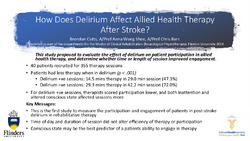Please use this identifier to cite or link to this item:
http://hdl.handle.net/11054/1301| Title: | How does delirium affect allied health therapy after stroke? |
| Author: | Cutts, Brendan Wong Shee, Anna Barr, Chris |
| Issue Date: | 2019 |
| Conference Name: | 3rd Victorian Allied Health Research Conference |
| Conference Date: | March 22 |
| Conference Place: | Melbourne, Australia |
| Abstract: | Aim: Delirium is a common complication post-stroke and increases risk of mortality and admission to residential aged care. This study proposed to evaluate the effect of delirium on patient participation in allied health therapy and determine whether time or length of session improved engagement. Method: Observational study conducted in a regional Victorian health service. Patients in the first four weeks post-stroke were assessed for delirium using the Confusion Assessment Method, and physiotherapists, occupational therapists and speech pathologists completed a survey after each therapy session scoring the effect of symptoms of delirium on the therapy session. Results: Patients who developed delirium were older (79.3 years, SD 9.9 vs 69.0 years, SD 13.6, p = .024) and had more severe strokes (National Institutes of Health Stroke Scale 12.2, SD 7.8 vs 6.9, SD 4.6, p = .011) compared with patients who didn’t develop delirium. Therapy sessions while a patient was in delirium were shorter and proportion of therapy during therapist contact time was lower. Therapist-rated scores of participation were lower, and both inattention and altered conscious state affected sessions more in the delirious group. Time of day did not alter any outcome. Significance: Post-stroke delirium has a significant effect on engagement in allied health therapy. Sessions less than 30 minutes in length reduce the effects of inattention for patients in delirium. There is a need to identify strategies to mitigate the impact of delirium and ensure patients are given optimal therapy. Biography: Brendan Cutts is a physiotherapist with an interest in how allied health teams manage acute stroke survivors and is currently working at Barwon Health. This research was completed as part of Brendan attaining the Master of Clinical Rehabilitation (Neurological Physiotherapy) from Flinders University. |
| URI: | http://hdl.handle.net/11054/1301 |
| Resource Link: | http://www.ahresearch.com.au/3294 |
| Internal ID Number: | 01329 |
| Health Subject: | CONFUSION ASSESSMENT METHOD PATIENT PARTICIPATION |
| Type: | Conference Presentation |
| Appears in Collections: | Research Output |
Files in This Item:
| File | Description | Size | Format | |
|---|---|---|---|---|
| VAHRC presentation Brendan Cutts.pdf | ppt | 646.92 kB | Adobe PDF |  View/Open |
Items in DSpace are protected by copyright, with all rights reserved, unless otherwise indicated.
